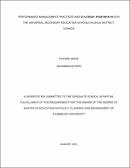| dc.contributor.author | Nyende, Diana | |
| dc.date.accessioned | 2022-03-17T10:51:11Z | |
| dc.date.available | 2022-03-17T10:51:11Z | |
| dc.date.issued | 2021-08 | |
| dc.identifier.citation | Nyende, Diana (2021). Performance management practices and teachers' performance in the Universal Secondary Education schools in Jinja district, Uganda.Kyambogo University(Un published work) | en_US |
| dc.identifier.uri | https://kyuspace.kyu.ac.ug/handle/20.500.12504/893 | |
| dc.description | xiii,74 p. | en_US |
| dc.description.abstract | This study sought to examine the relationship between Performance management practices and teachers’ performance in the Universal Secondary Education schools in Jinja District, Uganda. The study was guided by the following objectives: to assess the relationship between Performance Planning and Teachers’ performance; to examine the relationship between Performance Monitoring and Teachers’ performance; and to investigate the relationship between Performance Reviewing and Teachers’ performance in the Universal Secondary Education schools in Jinja District. Data was collected from 136 teachers. The respondents were selected from three categories of schools namely: rural, semi-urban and urban schools. The study employed a correlational research design in order to establish the relationship between the two study variables. Only quantitative data was collected from the study respondents using self-administered research questions. Statistical analyses including descriptive and inferential analyses were adopted in the study. Descriptive analysis involved the use of frequencies, means and standard deviations. Inferential analysis involved Pearson’s correlation to examine the relationship between the study variables and the independent sample t-test and one-way ANOVA to compare the means of the respondents in light of teachers’ performance. The study findings revealed significant differences in teacher performance based on the categorical variables of location of schools, age, teaching experience and the level of education attained. However, there was no statistically significant difference between the level of teacher performance based on the variable of gender. The study also found out that there is a statistically significant positive relationship between performance planning and teacher’s performance. Performance monitoring was also found to be statistically significantly related to teacher performance. Finally, the study found out that although performance reviewing is positively correlated to teacher performance, the relationship between the two variables is not statistically significant. From the study findings, it can be concluded that: performance planning as a performance management practice is a significant factor in enhancing teacher performance in USE schools; monitoring teachers’ performance critical for the success of the teaching and learning processes in the USE schools and that the implementation of performance reviewing practices in USE schools is less likely to result in enhanced teachers’ performance. Among the key study recommendations are the following: that the schools should improve the practice of performance monitoring by improving the user friendliness of the performance monitoring system. This can be done through the introduction of automated/ICT enabled performance monitoring systems the Universal secondary education schools. Such a move will go a long way in standardizing the practice of performance monitoring in schools. | en_US |
| dc.language.iso | en | en_US |
| dc.publisher | Kyambogo University(Un published work) | en_US |
| dc.subject | Management practices | en_US |
| dc.subject | Teachers' performance | en_US |
| dc.subject | Universal Secondary Education | en_US |
| dc.subject | Jinja district | en_US |
| dc.subject | Uganda | en_US |
| dc.title | Performance management practices and teachers' performance in the Universal Secondary Education schools in Jinja district, Uganda | en_US |
| dc.type | Thesis | en_US |

